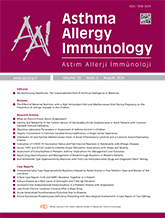


Objective: Rapid drug desensitization (RDD) is a safe and effective method of inducing temporary tolerance and gradually increasing the dose over a few hours to a few days, thereby preventing severe hypersensitivity reactions. Despite the limited number of pediatric desensitization studies in the literature, it is important to explore this area further to provide better treatment options for patients. This study will determine the safety and efficacy of desensitization and present management strategies for breakthrough reactions in pediatric patients with immediate hypersensitivity reactions (HSR).
Materials and Methods: This retrospective study enrolled 14 pediatric patients with drug HSRs who underwent drug desensitization between January 2020 and January 2024. The desensitization protocols used were developed by Castells and consisted of a 12-step protocol with 3 parenteral preparations with increasing concentrations. The standard protocol included premedication with antihistamine (pheniramine) and methylprednisolone (1 mg/kg) 30 minutes before the infusion.
Results: The study involved 14 patients. A total of 64 desensitizations were carried out for 16 different drugs. Only 13% resulted in mild to severe reactions. Overall, almost 92% of all desensitizations were successful. Additionally, it is important to highlight that all breakthrough reactions (BRs) occurred with monoclonal antibodies. Mild BRs during RDD were associated with more severe reactions during the next RDDs. No BRs were seen during RDD in patients with mild initial reactions.
Conclusion: It is important to note that desensitization is not an extreme method, and that pediatric age is not a contraindication. Desensitization is a safe and successful method for children, with a positive impact on survival and overall prognosis.